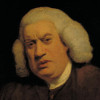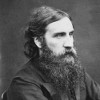“ But one cannot sense without a body: therefore the body must be some part of man. ”
Thomas Aquinas, Summa Theologica (1274). copy citation
| Author | Thomas Aquinas |
|---|---|
| Source | Summa Theologica |
| Topic | body senses |
| Date | 1274 |
| Language | English |
| Reference | |
| Note | Translated by Fathers of the English Dominican Province |
| Weblink | http://www.gutenberg.org/cache/epub/17611/pg17611-images.html |
Context
“or that intelligence is a part of Socrates. The first cannot stand, as was shown above (Q. 75, A. 4) , for this reason, that it is one and the same man who is conscious both that he understands, and that he senses. But one cannot sense without a body: therefore the body must be some part of man. It follows therefore that the intellect by which Socrates understands is a part of Socrates, so that in some way it is united to the body of Socrates.
The Commentator held that this union is through the intelligible species, as having a double subject, in the possible intellect, and in the phantasms which are in the corporeal organs.”
source



